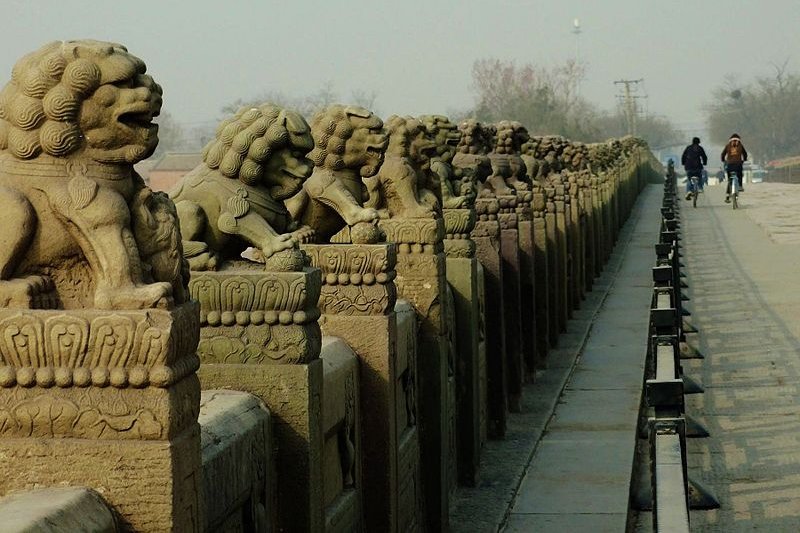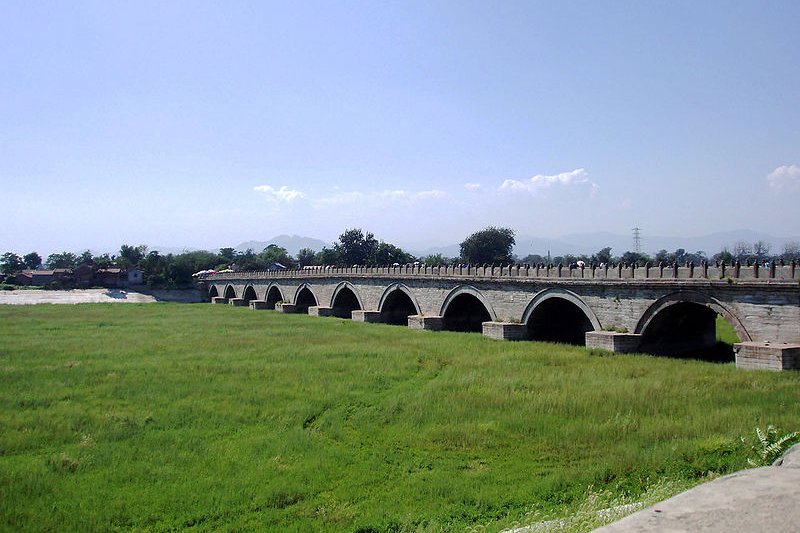 Marco Polo Bridge, Beijing
Marco Polo Bridge, BeijingSource: http://commons.wikimedia.org/wiki/File:%E5%8D%A2%E6%B2%9F%E6%A1%A5%E7%9A%84%E7%8B%AE%E5%AD%90_%E9%80%8F%E8%A7%86.JPG
Author: Charlie fong

Author: Charlie fong

The Marco Polo Bridge, also known as Lugou Qiao or Lugou Bridge, is a 267-meter (876 feet) bridge across the Yongding River, 16 km (10 miles) to the southwest of Beijing city center. The original structure was built in 1189, but was destroyed by a flood a long time ago. The bridge that we see today is said to have been built in 1698, and despite extensive restoration and widening carried out on it, much of the bridge is still surprisingly original.
The Marco Polo Bridge got its English name because it was mentioned in Marco Polo's treatise, The Travels of Marco Polo. On either ends of the bridge are stelae erected by the Kangxi and Qianlong emperors of the Qing dynasty.
 Luguo Bridge
Luguo BridgeSource: http://commons.wikimedia.org/wiki/File:Lugouqiao2.jpg
Author: Fanghong

Decorating the balustrades of Marco Polo Bridge are some 400 stone lions. Each lion figurine is unique in its appearance. The local belief has it that these lions come alive at night.
The Marco Polo Bridge was also the site of a confrontation between the Japanese Imperial Army and the Nationalist Chinese soldiers on 7 July, 1937. This led to the Japanese occupation of Beijing. The gory details of the Japanese atrocity is documented in Wanpin's memorial hall.
Looking for information on Penang? Use this Map of Roads in Penang to zoom in on information about Penang, brought to you road by road.

Author: Fanghong

Decorating the balustrades of Marco Polo Bridge are some 400 stone lions. Each lion figurine is unique in its appearance. The local belief has it that these lions come alive at night.
The Marco Polo Bridge was also the site of a confrontation between the Japanese Imperial Army and the Nationalist Chinese soldiers on 7 July, 1937. This led to the Japanese occupation of Beijing. The gory details of the Japanese atrocity is documented in Wanpin's memorial hall.
How to reach the Marco Polo Bridge
Take bus 339 from Beijing's Lianhuachi bus station. Latest updates on Penang Travel Tips
Latest updates on Penang Travel Tips
 Map of Roads in Penang
Map of Roads in Penang
Looking for information on Penang? Use this Map of Roads in Penang to zoom in on information about Penang, brought to you road by road.
Copyright © 2003-2025 Timothy Tye. All Rights Reserved.

 Go Back
Go Back